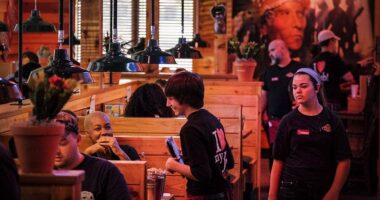Derek Kinnison, convicted of obstruction in the Jan. 6 attack on the Capitol, is serving two years and nine months in a federal prison in Victorville. But he hopes to get out sooner — much sooner — after the U.S. Supreme Court decision Friday, June 28, limiting how prosecutors can use the federal obstruction law against the rioters. Kinnison, a Lake Elsinore resident, is among 350 people nationwide charged under the law in the 2021 siege. Overall, more than 1,300 people have been charged with federal crimes related to the Jan. 6 breach, according to the U.S. Department of Justice.
Related: Supreme Court makes it harder to charge Jan. 6 defendants — and Trump — with obstruction
“I expect his sentence to be reduced by about two-thirds,” said Kinnison’s attorney, Nicolai Cocis. “To those who were charged, it is a big deal. (The ruling) overturns one of the more serious charges.” The maximum prison sentence under the obstruction statute is 20 years.
In addition to the obstruction conviction, Kinnison also was found guilty of felony tampering with documents or proceedings for erasing social media chats from his phone to hide them from a grand jury investigation. He also was convicted of misdemeanor offenses of entering and remaining on restricted grounds and disruptive conduct on restricted grounds. Kinnison, 42, was not accused of entering the building.
Convicted with Kinnison after a 17-day trial in Washington, D.C., were Erik Scott Warner, 48, of Menifee; Felipe Antonio “Tony” Martinez, 50, of Lake Elsinore; and Ronald Mele, 54, of Temecula. All were convicted of obstruction and other charges, receiving sentences ranging from one year and nine months in prison to two years and nine months.
The men were members of the Three Percenters, a group that says it believes only 3% of American colonists took up arms against the British during the American Revolution. Some liken the current U.S. government to British authorities who infringed on civil liberties.
Kinnison viewed the drive to Washington, D.C., as a “road trip” to support former President Donald Trump. But Cocis has acknowledged that the men brought ballistic vests, bear spray, gas masks, handguns and shotguns. Those items were for protection, Cocis said, because the men had “heard stories of Antifa attacking Trump supporters.”
In all, more than a dozen people with ties to Southern California have been convicted for their roles in the riot, including former La Habra Police Chief Alan Hostetter, who is serving an 11-year sentence in Oakdale, Louisiana. Hostetter’s sentence, among the most severe among so-called J6 defendants, came after he was convicted of obstruction and three other felonies.
Warner’s lawyer, Kira Anne West, called the court ruling Friday a “beautiful thing.” “I’ve been on the phone for 2 1/2 hours with clients and attorneys,” said West, who represents 20 people charged or convicted in the attempt to keep Congress from certifying the election. She said it was too early to tell how the justices’ decision will affect her cases.
The high court ruling in the case of a Pennsylvania police officer now sends the issue back to the appellate court to take another look at the legality of the obstruction charge. West and Cocis agreed that prosecutors had gone too far in interpreting the obstruction law, enacted in 2002 in response to the Enron Corp. scandal.
Justices ruled 6-3 that the law applied only to tampering or destroying records, documents or other objects in an official proceeding. “From the beginning, we argued that this law did not apply to Mr. Kinnison, but our concerns were ignored,” Cocis said. “The Supreme Court has now agreed, clarifying that the law pertains only to specific types of evidence tampering, not the broader range of situations claimed by the prosecutors. What the court actually did was prevent the government from misapplying a law.”
However, according to experts, prosecutors likely will counter that interfering with the counting of electoral votes qualifies under the law — although it may be harder to prove. “It’s a significant problem,” said Lawrence Rosenthal, a former federal prosecutor and a law professor at Chapman University. “Prosecutors like straightforward cases. Now they have to prove a more complicated case, it’s not quite as jury friendly.”
Rosenthal predicted there would be much to sort out by the courts as those charged, convicted or facing trial attempt to apply the ruling to their individual cases. He said those who have pleaded guilty have waived further proceedings and would not likely get any relief. People still facing





